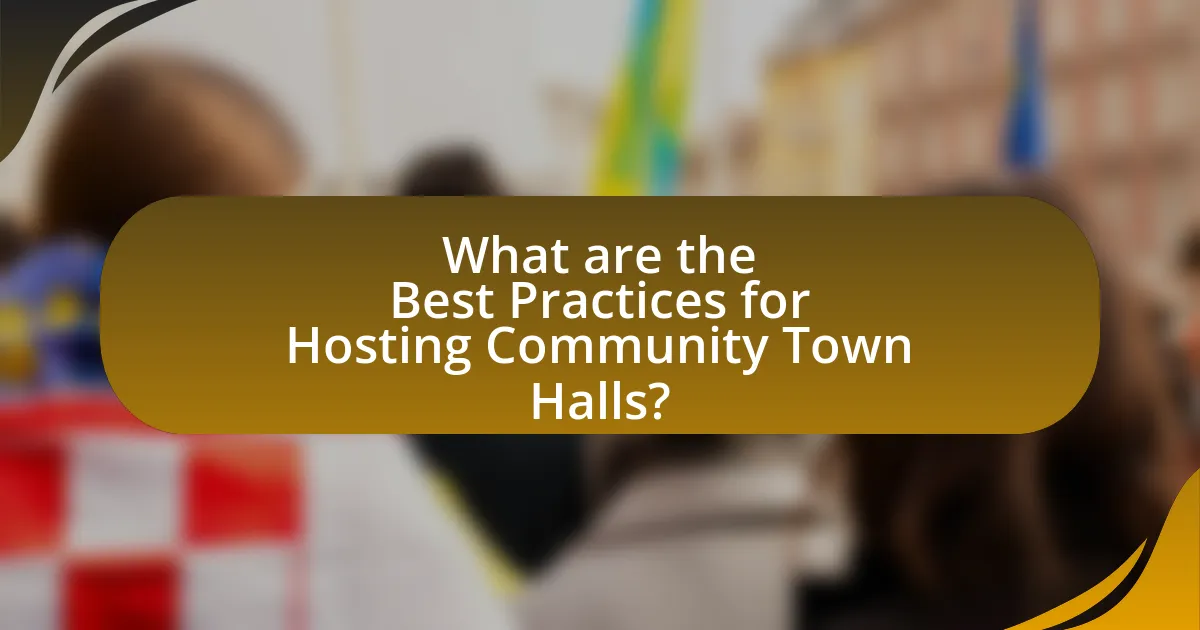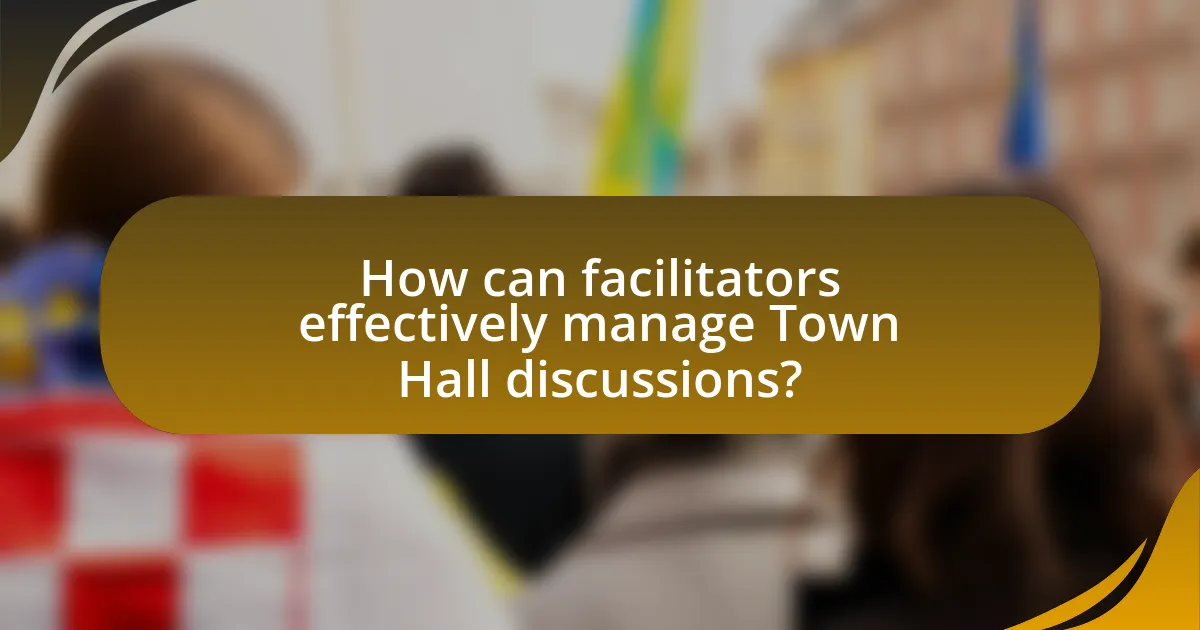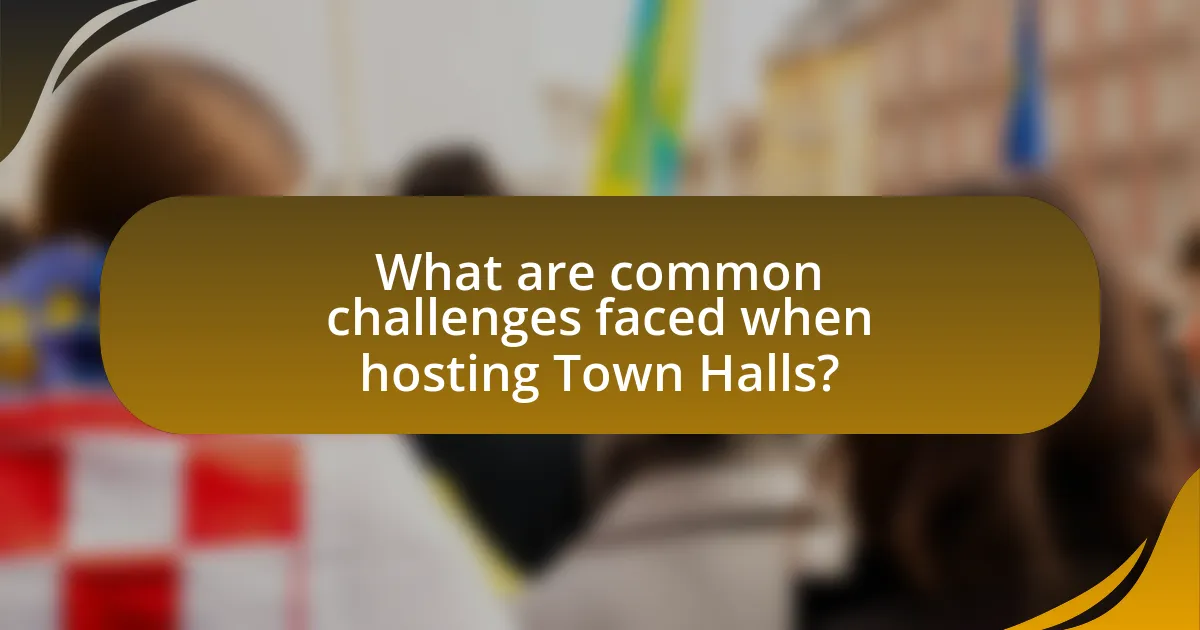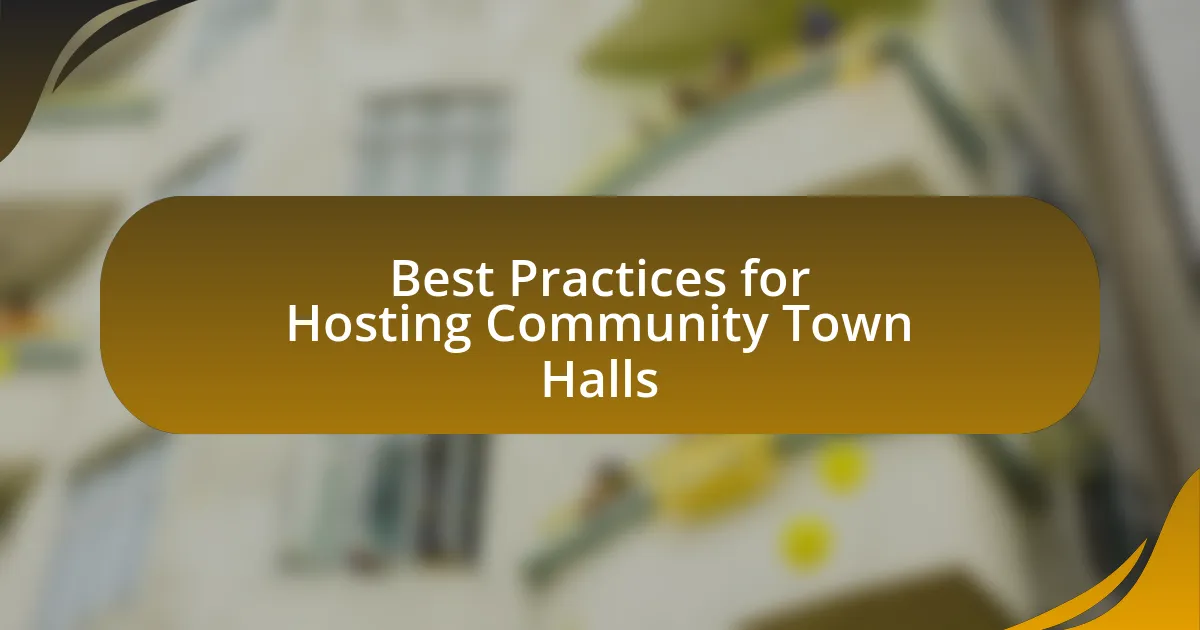The article focuses on best practices for hosting community town halls, emphasizing the importance of clear communication, effective planning, and active engagement to enhance participation and trust among community members. It outlines the significance of these gatherings in fostering transparency and civic engagement, detailing key elements such as structured agendas, accessible venues, and the use of technology to facilitate interaction. Additionally, the article addresses strategies for encouraging participation, managing discussions, and gathering feedback, while also highlighting common challenges and logistical issues that may arise during town hall events. Overall, it serves as a comprehensive guide for organizing successful community town halls that strengthen local governance and community ties.

What are the Best Practices for Hosting Community Town Halls?
The best practices for hosting community town halls include clear communication, effective planning, and active engagement. Clear communication ensures that all participants understand the purpose and agenda of the town hall, which can be achieved by distributing information in advance through various channels such as emails, social media, and community boards. Effective planning involves selecting an accessible venue, scheduling the event at a convenient time, and preparing necessary materials, such as presentations or handouts, to facilitate discussion. Active engagement can be fostered by encouraging questions and feedback from attendees, utilizing interactive tools like polls or Q&A sessions, and ensuring that all voices are heard, which enhances community involvement and trust. These practices are supported by research indicating that well-organized town halls lead to higher participation rates and more productive discussions, ultimately strengthening community ties.
Why are Community Town Halls Important?
Community Town Halls are important because they facilitate direct communication between local government officials and community members, fostering transparency and civic engagement. These gatherings allow residents to voice concerns, ask questions, and provide input on local issues, which can lead to more informed decision-making by officials. Research indicates that communities with regular town hall meetings experience higher levels of public trust and participation in local governance, as evidenced by a study from the International City/County Management Association, which found that 70% of participants felt more connected to their local government after attending such events.
What role do they play in community engagement?
Community town halls play a crucial role in community engagement by facilitating direct communication between local leaders and residents. They provide a platform for citizens to voice their concerns, share ideas, and participate in decision-making processes. Research indicates that town halls can increase civic participation, as evidenced by a study from the National Civic League, which found that communities with regular town hall meetings reported higher levels of public trust and engagement in local governance. This interaction fosters a sense of community ownership and accountability, ultimately leading to more informed and responsive local policies.
How do they foster transparency and trust?
They foster transparency and trust by openly sharing information and encouraging community participation. This approach includes providing clear agendas before town hall meetings, allowing community members to voice their concerns and questions, and ensuring that responses are honest and comprehensive. For instance, studies show that communities with regular, transparent communication from leaders experience higher levels of trust and engagement, as evidenced by a 2020 survey from the International City/County Management Association, which found that 75% of residents felt more connected to their local government when they were informed about decision-making processes.
What are the key elements of a successful Town Hall?
The key elements of a successful Town Hall include clear communication, community engagement, and effective facilitation. Clear communication ensures that the purpose and agenda of the Town Hall are well-defined and shared with participants in advance, which fosters transparency and trust. Community engagement involves actively involving attendees in discussions, encouraging questions, and valuing their input, which enhances participation and ownership of community issues. Effective facilitation is crucial for managing the flow of the meeting, keeping discussions on track, and ensuring that all voices are heard, which contributes to a productive and inclusive environment. These elements collectively create a Town Hall that is informative, participatory, and impactful for the community.
How should the agenda be structured?
The agenda should be structured with clear time allocations for each topic, ensuring that all relevant issues are addressed efficiently. A well-structured agenda typically includes an introduction, a review of previous meeting minutes, a list of discussion topics prioritized by importance, designated time slots for each topic, and a conclusion that summarizes key points and outlines next steps. This format promotes organization and keeps participants focused, which is essential for effective community engagement during town halls.
What is the ideal location for hosting a Town Hall?
The ideal location for hosting a Town Hall is a central, accessible venue that accommodates the expected audience size. Such locations often include community centers, libraries, or local government buildings, which are typically equipped with necessary facilities like seating, audio-visual equipment, and parking. Accessibility is crucial; venues should be reachable by public transportation and compliant with ADA standards to ensure participation from all community members. Studies show that well-located Town Halls can increase attendance and engagement, as evidenced by a report from the International City/County Management Association, which highlights that accessibility directly correlates with community involvement in civic activities.
How can technology enhance the Town Hall experience?
Technology can enhance the Town Hall experience by facilitating real-time communication and engagement between community members and local officials. Tools such as live streaming, social media platforms, and interactive polling allow for broader participation, enabling residents who cannot attend in person to contribute their opinions and questions. For instance, a study by the International City/County Management Association found that municipalities using digital platforms for Town Halls saw a 30% increase in public participation. Additionally, technology can streamline the organization of events through online registration and reminders, ensuring higher attendance and better preparation.
What strategies can be employed to encourage participation?
To encourage participation in community town halls, strategies such as providing incentives, ensuring accessibility, and fostering a welcoming environment can be employed. Offering incentives, such as refreshments or small giveaways, can motivate individuals to attend. Ensuring accessibility involves selecting venues that are easy to reach and accommodating for people with disabilities, which can significantly increase turnout. Additionally, fostering a welcoming environment by promoting inclusivity and actively engaging attendees through interactive discussions can enhance participation. Research indicates that communities that implement these strategies often see higher engagement rates, as evidenced by a study conducted by the International Association for Public Participation, which found that inclusive practices lead to a 30% increase in community involvement.
How can outreach efforts be effectively implemented?
Outreach efforts can be effectively implemented by utilizing targeted communication strategies that engage the community. This involves identifying key demographics, leveraging social media platforms, and collaborating with local organizations to disseminate information. Research indicates that tailored messaging increases participation rates; for instance, a study by the Pew Research Center found that 69% of adults use social media to connect with their communities. Additionally, hosting informational sessions and utilizing surveys can help gather community input, ensuring that outreach efforts are responsive to the needs and interests of the audience.
What incentives can be offered to attendees?
Incentives that can be offered to attendees include free refreshments, raffle prizes, and exclusive access to resources or information. Providing free refreshments encourages attendance by creating a welcoming environment, while raffle prizes can increase engagement and excitement, as studies show that people are more likely to participate when there is a chance to win something valuable. Exclusive access to resources or information, such as community reports or expert insights, adds value to the experience and can motivate attendees to participate actively.

How can facilitators effectively manage Town Hall discussions?
Facilitators can effectively manage Town Hall discussions by establishing clear guidelines and maintaining a structured agenda. Clear guidelines help participants understand the discussion format, time limits, and respectful communication expectations, which fosters a productive environment. A structured agenda ensures that all relevant topics are covered and allows for balanced participation, preventing any single voice from dominating the conversation. Research indicates that structured discussions lead to higher participant satisfaction and engagement, as seen in community engagement studies conducted by the International Association for Public Participation, which highlight the importance of organization in public forums.
What techniques can be used to ensure productive dialogue?
To ensure productive dialogue, active listening and open-ended questioning are essential techniques. Active listening involves fully concentrating on the speaker, understanding their message, and responding thoughtfully, which fosters a respectful environment. Open-ended questions encourage participants to share their thoughts and feelings, leading to deeper discussions and insights. Research indicates that these techniques enhance engagement and understanding among participants, ultimately resulting in more effective communication and collaboration during community town halls.
How can facilitators handle difficult questions or conflicts?
Facilitators can handle difficult questions or conflicts by employing active listening, maintaining neutrality, and encouraging open dialogue. Active listening allows facilitators to fully understand the concerns being raised, which helps in addressing them effectively. Maintaining neutrality ensures that facilitators do not take sides, fostering a safe environment for all participants to express their views. Encouraging open dialogue invites diverse perspectives, which can lead to collaborative problem-solving. Research indicates that effective conflict resolution strategies, such as these, can significantly enhance group cohesion and participant satisfaction in community settings.
What methods can be used to keep discussions on track?
To keep discussions on track during community town halls, facilitators can implement structured agendas, time limits for each speaker, and active moderation. Structured agendas provide a clear outline of topics to be discussed, ensuring that all relevant points are covered without digressing. Time limits for each speaker help maintain focus and prevent any single participant from dominating the conversation, which is supported by research indicating that time management enhances group productivity. Active moderation involves guiding the discussion, redirecting off-topic comments, and encouraging participation from quieter members, which has been shown to foster a more inclusive environment and keep the conversation aligned with the agenda.
How can feedback be gathered and utilized post-event?
Feedback can be gathered post-event through surveys, interviews, and focus groups. Surveys can be distributed via email or online platforms immediately after the event to capture attendees’ impressions while they are still fresh. Interviews and focus groups can provide deeper insights into participants’ experiences and suggestions for improvement. Utilizing this feedback involves analyzing the data to identify common themes and actionable items, which can then inform future event planning and enhance community engagement. For instance, a study by the International Association for Public Participation found that structured feedback mechanisms significantly improve participant satisfaction and event effectiveness.
What tools can be used for collecting participant feedback?
Surveys and feedback forms are effective tools for collecting participant feedback. These tools can be implemented through platforms such as Google Forms, SurveyMonkey, and Typeform, which allow for the creation of customized questionnaires that can capture participant opinions and experiences. Research indicates that using structured surveys can lead to higher response rates and more actionable insights, as they facilitate the collection of quantitative and qualitative data from participants.
How can feedback inform future Town Halls?
Feedback can inform future Town Halls by identifying community concerns and preferences, which can guide agenda setting and improve engagement strategies. For instance, surveys conducted after previous Town Halls often reveal specific topics that residents want to discuss, allowing organizers to tailor future events to address these interests directly. Additionally, analyzing feedback trends can highlight areas where communication may have fallen short, enabling organizers to enhance clarity and effectiveness in future presentations. This approach is supported by data from community engagement studies, which show that responsive adjustments based on participant feedback lead to higher attendance and satisfaction rates in subsequent events.

What are common challenges faced when hosting Town Halls?
Common challenges faced when hosting Town Halls include low attendance, lack of engagement, and difficulty in managing diverse opinions. Low attendance can stem from inadequate promotion or scheduling conflicts, which limits community participation. Lack of engagement often arises when the format does not encourage interaction, leading to a one-sided conversation. Additionally, managing diverse opinions can be challenging, as differing viewpoints may lead to conflict or disrupt the flow of the meeting. These challenges can hinder the effectiveness of Town Halls in fostering community dialogue and decision-making.
What logistical issues might arise?
Logistical issues that might arise during community town halls include venue accessibility, scheduling conflicts, and inadequate resource allocation. Venue accessibility can hinder participation if the location is not easily reachable or lacks necessary accommodations for individuals with disabilities. Scheduling conflicts may occur if the chosen date and time overlap with other community events, leading to lower attendance. Inadequate resource allocation, such as insufficient seating, materials, or technology for presentations, can disrupt the flow of the event and diminish the overall experience for attendees. These factors can significantly impact the effectiveness of the town hall and the engagement of the community.
How can scheduling conflicts be minimized?
Scheduling conflicts can be minimized by implementing a centralized scheduling system that allows all participants to view and select available time slots. This approach ensures transparency and facilitates coordination among attendees, reducing the likelihood of overlapping commitments. Research indicates that organizations using shared calendars experience a 30% decrease in scheduling conflicts, as it streamlines communication and enhances planning efficiency.
What are the best practices for managing technical difficulties?
The best practices for managing technical difficulties include proactive preparation, real-time troubleshooting, and effective communication. Proactive preparation involves testing all technology and equipment prior to the event to identify potential issues, ensuring that backup systems are in place, and providing clear instructions for participants on how to access the technology. Real-time troubleshooting requires having a dedicated technical support team available during the event to address any issues as they arise, minimizing disruptions. Effective communication entails informing participants about potential technical difficulties and providing updates throughout the event, which helps maintain engagement and manage expectations. These practices are supported by research indicating that thorough preparation and responsive support significantly enhance participant satisfaction and event success.
How can facilitators address community concerns effectively?
Facilitators can address community concerns effectively by actively listening to participants and creating an inclusive environment for dialogue. This approach ensures that all voices are heard, fostering trust and transparency. Research indicates that when facilitators employ techniques such as open-ended questions and reflective listening, they can significantly enhance participant engagement and satisfaction (Schwarz, 2016, “The Skilled Facilitator”). By validating community members’ feelings and concerns, facilitators can build rapport and encourage constructive discussions, ultimately leading to more effective problem-solving and decision-making.
What strategies can be used to ensure all voices are heard?
To ensure all voices are heard during community town halls, implement strategies such as structured facilitation, anonymous feedback mechanisms, and diverse representation. Structured facilitation involves trained moderators who encourage participation from all attendees, ensuring that quieter voices are invited to share their perspectives. Anonymous feedback mechanisms, such as suggestion boxes or digital platforms, allow individuals to express their thoughts without fear of judgment, thereby increasing participation from those who may feel marginalized. Additionally, ensuring diverse representation among speakers and panelists can help reflect the community’s demographics, making it more likely that various viewpoints are acknowledged and valued. These strategies are supported by research indicating that inclusive practices lead to higher engagement and satisfaction in community discussions.
How can facilitators build rapport with attendees?
Facilitators can build rapport with attendees by actively listening and engaging in open communication. This involves making eye contact, using participants’ names, and encouraging questions, which fosters a sense of trust and connection. Research indicates that effective communication strategies, such as mirroring body language and showing empathy, significantly enhance participant engagement and satisfaction in group settings. For instance, a study published in the Journal of Applied Psychology found that facilitators who practiced active listening were perceived as more trustworthy and approachable, leading to increased participation and collaboration among attendees.
What are the top tips for hosting successful Community Town Halls?
To host successful Community Town Halls, prioritize clear communication, active engagement, and thorough preparation. Clear communication involves setting a transparent agenda and sharing it in advance, which helps attendees understand the topics to be discussed. Active engagement can be fostered by encouraging questions and feedback throughout the event, ensuring that community members feel heard and valued. Thorough preparation includes selecting an accessible venue, utilizing technology for virtual participation, and having a skilled moderator to guide the discussion. These practices enhance participation and satisfaction, leading to more productive outcomes.
How can preparation enhance the overall experience?
Preparation enhances the overall experience by ensuring that all logistical details are addressed, which leads to a smoother event execution. When organizers prepare thoroughly, they can anticipate potential challenges, allocate resources effectively, and create a structured agenda that keeps participants engaged. For instance, a study by the International Association for Public Participation found that well-prepared community meetings result in higher participant satisfaction and increased community involvement. This correlation demonstrates that preparation not only improves the flow of the event but also fosters a sense of community ownership and engagement.
What follow-up actions are essential after the event?
Essential follow-up actions after the event include sending thank-you notes to participants, sharing a summary of the event outcomes, and gathering feedback through surveys. Thank-you notes foster goodwill and encourage future participation, while a summary of outcomes keeps the community informed about decisions made and next steps. Gathering feedback through surveys allows organizers to assess the event’s effectiveness and identify areas for improvement, which is crucial for enhancing future town halls.
